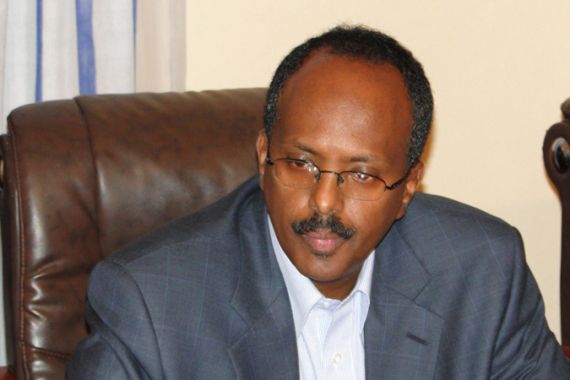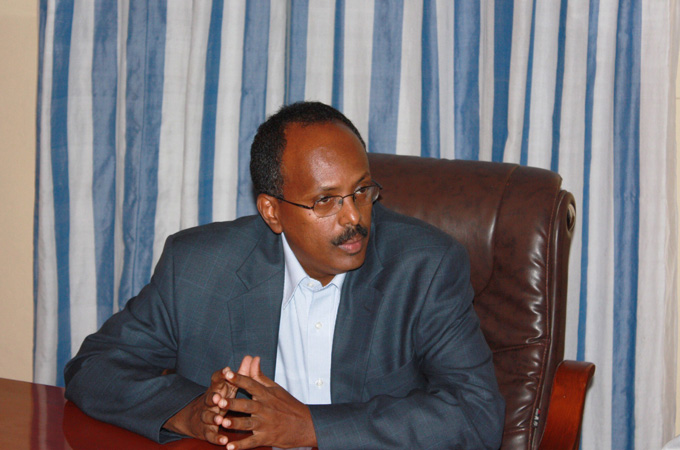Somali president appoints new PM
Sharif Ahmed names Mohamed Abdullahi Mohamed as new prime minister of the transitional government.

 |
|
Mohamed replaces Sharmarke, who resigned following a long-running feud with Somalia’s president [AFP] |
Sharif Ahmed, Somalia’s president, has named Mohamed Abdullahi Mohamed as the new prime minister of the transitional federal government on Thursday.
Mohamed replaces Omar Abdirashid Ali Sharmarke, the previous prime minister, who resigned on September 21 following a long-running feud with Ahmed.
“After consultation I have appointed Mohamed Abdullahi as the new prime minister. I wish him good luck,” Ahmed told legislators who gathered at his office in the capital, Mogadishu, on Thursday.
Ahmed has tried to reassert his authority over a brittle administration and a disillusioned nation.
“My first priority is security, and performing my duties for the Somali people,” Mohamed told Reuters news agency.
“We have to deal with the insurgents who are behind the meaningless bloodshed in Somalia, either by fighting them or by reconciling with them, if they are ready for that,” said the 48-year-old Mohamed, a Somali-American who was formerly a diplomat at the Somali embassy in Washington.
Fresh start
|
“He stands a very good chance to have a positive impact. He is not carrying any political baggage.” Afyare Abdi Elmi, political science professor at Qatar University |
The Somali parliament will need to confirm Mohamed’s appointment, and he will be asked to name a cabinet within one month.
Mark Bowden, a top UN official with oversight of Somalia, said Mohamed’s cabinet is expected to be smaller than the bloated team that Sharmarke had.
Among officials in Sharmarke’s cabinet was a minister of tourism though the violence-ridden country sees only a handful of tourists each year.
Afyare Abdi Elmi, a political science professor at Qatar University, told Reuters he hoped Mohamed’s background in the Somali diaspora and his relatively young age would help re-energise the government by offering a fresh perspective.
“He stands a very good chance to have a positive impact. He is not carrying any political baggage,” Elmi said.
Clan-based politics
Hassan Mohamed, a local elder, said the new prime minister’s southern origins could also help him to persuade some of the rebel elements from that region to join the government.
“This PM is from Gedo region, and we hope most of his clan, which is now controlled by al-Shabab, will support the government,” Mohamed said.
However, Elmi played down the prime minister’s clan links, saying it would really take a few months to see how effective he would be in his new role.
“Explaining Somali politics in clan terms has not worked,” Elmi said.
Under a power-sharing accord in Somalia’s transitional government, the president, prime minister, speaker of parliament and supreme court chief cannot be from the same clans.
The agreement – known as the “4.5 formula” – divides Somalia into four major clans and an alliance of minority clans.
Sharif is a member of the Hawiye clan, and the new premier is from the Darod clan.
Security woes
The federal government has failed to end a three-year insurgency by hardline al-Shabab fighters who now control much of the capital and huge chunks of south and central Somalia.
Its survival has only been guaranteed by a contingent of African Union troops from Uganda and Burundi.
The government has accomplished little since its inception in 2004. Somalia has not had a fully functioning government since 1991, when warlords overthrew the president.
The US last month announced a new, dual-track approach to Somalia that will see continued American support of the transitional government in addition to new, direct support of other groups and regions in Somalia.
The policy changes include increased support for the semi-autonomous Somali regions of Somaliland and Puntland.